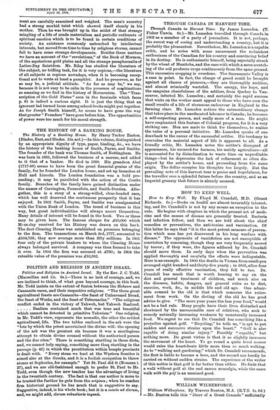POLITICS AND RELIGION IN ANCIENT ISRAEL.
Polities and Religion in Ancient Israel. By the Rev. J. C. Todd. (Macmillan and Co. 6s.)—There is no lack of courage, and, we are inclined to think, of what goes beyond courage, in this book. Mr. Todd insists on the extent of fusion between the Hebrew and Canaanite races, and their respective religions. "The three great agricultural feasts are Canaanite—the feast of Unleavened Bread, the feast of Weeks, and the feast of Tabernacles." "The religions conflict ended in the victory of Yahweh, but Yahweh Baalized.
Baalism contained much that was true and beautiful which cannot be detected in primitive Yahwism." One religion, in Mr. Todd's view, represents the nomadic, the other the settled agricultural, life. The two tables enclosed in the ark were the "Iota by which the priest ascertained the divine will: the opening of the ark was the greatest sin because it was a sacrilegious attempt to obtain divine counsel without the authorised person and the due rites." There is something startling in these dicta, and, we cannot help saying, something more thaq startling in the passage (p. 42) in which the prostitution within temple precincts is dealt with. "Every stone we hurl at the Western Semites is aimed also at the Greeks, and it is a foolish occupation to throw stones at Sophocles, for example." Yet St. Paul did it (Romani' i. 27), and we are old-fashioned enough to prefer St. Paul to Mr. Todd, even though the new teacher has the advantage of living in the twentieth century. The fact is that our author is more to be trusted the further he gets from the engines; when he reaches firm historical ground he has much that is suggestive to say. Suggestive, indeed, is his whole book ; but it is a softie ad derum, and, we might add, derma robustioris
How to Keep Well. By Floyd M. Crandall, M.D. (Grant Richards. 6s.)—Books on health are almost invariably interest- ing, and Dr. Crandall's is not by any means an exception to the rule. He begins with chapters in which the present art of medi- cine and the causes of disease are generally treated. Bacteria and infection follow, and then we are told about the chief remedies or preventives, the anti-toxins and vaccination. Of this latter he says that "it is the most potent measure of preven- tion which man has yet discovered in his long warfare with disease." The opponents of vacciffation are not susceptible of conviction by reasoning, though they are very frequently moved by terror ; if they were, the figures adduced by Dr. Crandall should move them. In early days when the preventive was applied Thoroughly and carefully the effects were indisputable. Here is an example. In 1800 the deaths in Vienna from small-pox averaged eight hundred and thirty-five yearly ; in 1805, after four years of really effective vaccination, they fell to two. Dr. Crandall has much that is worth hearing to say on the diet and general treatment of children, and much also on the diseases, habits, dangers, and general rules as to diet, exercise, work, &e., in middle life and old ago. One admir- able counsel to the old is that which concerns the retire- ment from work. On the dieting of the old ho has good advice to give. "The more your years the less your food," would not be a bad rule. Many people have their lives disturbed and shortened by the unreasonable care of relatives, who seek to remedy naturally increasing weakness by unnaturally increased food. We regret to see that Dr. Crandall has something like a prejudice against golf. "Bicycling," he tells us, 'inapt to put sudden and excessive strains upon the heart." "Golf is also capable of doing similar injury." Possibly "capable," but nothing more. Its great virtue is that it so slightly increases the movement of the heart. To go round a quite level course would raise the heart-beats little more than so much walking. As to "walking and gardening," which Dr. Crandall recommends, the first is liable to become a bore, and the second can hardly be carried on without sudden strains. The experience of the writer of this notice is that golf is far better than either. He finds that a walk without golf at the end causes neuralgia, while the same walk with the golf is an unmixed good.






















































 Previous page
Previous page